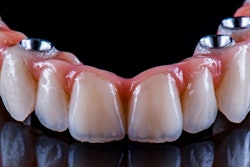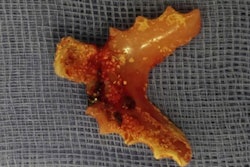
Having a higher number of fixed dental prostheses, which contain metal components, may be correlated with blood lead levels and changes in liver function, according to a study published on November 6 in Environmental Pollution.
Considering the possible links between fixed dental prostheses and liver function markers, clinicians should proactively consider liver conditions among patients with liver disease so that safer treatment plans may be created, according to a large U.S. study.
"This finding suggests an association between metal components in fixed dental prostheses and blood lead levels, which correlate with liver function markers, based on data from a sample of American adults," wrote the authors, led by Hengguo Zhang of Anhui Medical University in China.
Fixed dental prostheses are made of metal alloys, titanium, and ceramic materials and may contain lead, which can cause liver inflammation.
To explore the potential association between fixed dental prostheses, blood lead levels, and liver function, a cross-sectional study involving 3,624 adults in the U.S. was conducted. Demographic, blood level, and dental prosthetic data was taken from the U.S. National Health and Nutrition Examination Survey database. Models were then used to analyze the data, according to the study.
The mean blood lead concentration was lower in patients without dental prostheses (1.02 μg/dL; 95% confidence interval [CI], 0.96-1.09) compared to those with dental prostheses (1.15 μg/dL; 95% CI, 1.11-1.20) (p < 0.001). Furthermore, analyses suggested a positive link between blood lead levels and dental prosthesis count in the general population (β = 0.03; 95% CI, 0.03-0.04), the authors wrote.
For multivariate regression analysis, there was a positive correlation between blood lead levels and dental prosthesis count for males (β = 0.02; 95% CI, 0.01-0.04) and females (β = 0.04; 95% CI, 0.03-0.05) in the adjusted model.
Furthermore, the number of fixed dental prostheses was shown to be associated with changes in liver function markers, specifically decreasing in the enzyme alanine transaminase levels, which is a marker of liver damage or disease, through elevated blood lead levels in males, the authors wrote.
Nevertheless, the study had limitations, including its cross-sectional nature. The results are limited to observed associations, they wrote.
In addition to prosthodontists taking liver function into consideration when developing treatment plans, manufacturers of oral prosthetics may want to think about purifying heavy metals during prosthodontic material fabrication, the authors wrote.
"A greater number of fixed dental prostheses were associated with changes in liver function markers," Zhang and colleagues wrote.




















